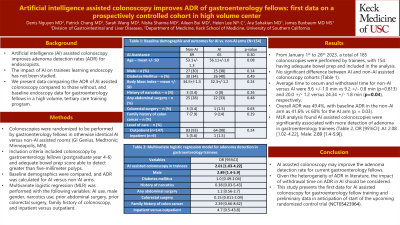Monday Poster Session
Category: Colorectal Cancer Prevention
P1748 - Artificial Intelligence-Assisted Colonoscopy Improves ADR of Gastroenterology Fellows: Results of a Prospective Cohort Study
Monday, October 23, 2023
10:30 AM - 4:15 PM PT
Location: Exhibit Hall

Has Audio

Denis Nguyen, MD
Keck School of Medicine of USC
Los Angeles, CA
Presenting Author(s)
Denis Nguyen, MD1, Patrick Chang, MD2, Sarah Wang, MD, MPH1, Nisha Sharma, MD1, Aileen Bui, MD2, Niwen Kong, MD1, Helen Lee, NP2, Ara Sahakian, MD2, James Buxbaum, MD, MS1
1Keck School of Medicine of USC, Los Angeles, CA; 2University of Southern California, Los Angeles, CA
Introduction: Artificial intelligence (AI) assisted colonoscopy has been shown to improve adenoma detection rates for attending endoscopists, but its impact on trainees learning endoscopy is undefined. Herein, we present a study comparing the adenoma detection rate (ADR) of AI assisted colonoscopy compared to those without AI for gastroenterology fellows in a high volume, tertiary care training program.
Methods: We prospectively assessed the performance of gastroenterology fellows in otherwise identical AI versus non-AI assisted rooms (GI Genius, Medtronic; Minneapolis, MN). Inclusion criteria included colonoscopy by gastroenterology fellows (postgraduate year 4-6) and adequate bowel prep score able to detect greater than five-millimeter polyps. Baseline demographics were compared, and adenoma detection rate (ADR) was calculated for AI versus non-AI arms. A multivariate logistic regression model was created for the following variables: artificial intelligence use, male gender, narcotics use, prior abdominal surgery, family history of colonic neoplasia, and inpatient versus outpatient setting.
Results: A total of 185 colonoscopies were performed by trainees for which 154 colonoscopies had adequate bowel prep and were included in the analysis. There was no significant difference in the patient characteristics among the AI and non-AI assisted colonoscopy cohorts. Average withdrawal time was greater for AI (23.9 + 1.7 minutes) versus non-AI (20.3 + 1.4 minutes), (p=0.048), but total procedure time did not significantly differ (AI: 31.9 + 1.9 versus non-AI: 29.1 + 1.5 minutes, p=0.129). Overall ADR was higher for trainee colonoscopies performed with AI, 60%, versus without AI, 41.6% (p=0.03).
Multivariate logistic regression analysis found AI assisted colonoscopies remained strongly associated with increased adenoma detection by gastroenterology trainees (Table 1, OR [95%CI]: 2.01 [1.03-4.22]) after controlling for patient demographics, past history, and inpatient versus outpatient status.
Discussion: AI assisted colonoscopy improves the adenoma detection rate for gastroenterology fellows. This study presents the first data for AI assisted colonoscopy in GI fellows in anticipation of the start of an upcoming randomized control trial (NCT05423964) to define its impact on trainee learning curve and performance.
Disclosures:
Denis Nguyen, MD1, Patrick Chang, MD2, Sarah Wang, MD, MPH1, Nisha Sharma, MD1, Aileen Bui, MD2, Niwen Kong, MD1, Helen Lee, NP2, Ara Sahakian, MD2, James Buxbaum, MD, MS1. P1748 - Artificial Intelligence-Assisted Colonoscopy Improves ADR of Gastroenterology Fellows: Results of a Prospective Cohort Study, ACG 2023 Annual Scientific Meeting Abstracts. Vancouver, BC, Canada: American College of Gastroenterology.
1Keck School of Medicine of USC, Los Angeles, CA; 2University of Southern California, Los Angeles, CA
Introduction: Artificial intelligence (AI) assisted colonoscopy has been shown to improve adenoma detection rates for attending endoscopists, but its impact on trainees learning endoscopy is undefined. Herein, we present a study comparing the adenoma detection rate (ADR) of AI assisted colonoscopy compared to those without AI for gastroenterology fellows in a high volume, tertiary care training program.
Methods: We prospectively assessed the performance of gastroenterology fellows in otherwise identical AI versus non-AI assisted rooms (GI Genius, Medtronic; Minneapolis, MN). Inclusion criteria included colonoscopy by gastroenterology fellows (postgraduate year 4-6) and adequate bowel prep score able to detect greater than five-millimeter polyps. Baseline demographics were compared, and adenoma detection rate (ADR) was calculated for AI versus non-AI arms. A multivariate logistic regression model was created for the following variables: artificial intelligence use, male gender, narcotics use, prior abdominal surgery, family history of colonic neoplasia, and inpatient versus outpatient setting.
Results: A total of 185 colonoscopies were performed by trainees for which 154 colonoscopies had adequate bowel prep and were included in the analysis. There was no significant difference in the patient characteristics among the AI and non-AI assisted colonoscopy cohorts. Average withdrawal time was greater for AI (23.9 + 1.7 minutes) versus non-AI (20.3 + 1.4 minutes), (p=0.048), but total procedure time did not significantly differ (AI: 31.9 + 1.9 versus non-AI: 29.1 + 1.5 minutes, p=0.129). Overall ADR was higher for trainee colonoscopies performed with AI, 60%, versus without AI, 41.6% (p=0.03).
Multivariate logistic regression analysis found AI assisted colonoscopies remained strongly associated with increased adenoma detection by gastroenterology trainees (Table 1, OR [95%CI]: 2.01 [1.03-4.22]) after controlling for patient demographics, past history, and inpatient versus outpatient status.
Discussion: AI assisted colonoscopy improves the adenoma detection rate for gastroenterology fellows. This study presents the first data for AI assisted colonoscopy in GI fellows in anticipation of the start of an upcoming randomized control trial (NCT05423964) to define its impact on trainee learning curve and performance.
Disclosures:
Denis Nguyen indicated no relevant financial relationships.
Patrick Chang indicated no relevant financial relationships.
Sarah Wang indicated no relevant financial relationships.
Nisha Sharma indicated no relevant financial relationships.
Aileen Bui indicated no relevant financial relationships.
Niwen Kong indicated no relevant financial relationships.
Helen Lee indicated no relevant financial relationships.
Ara Sahakian: Boston Scientific – Consultant. Cook Medical – Consultant. Noah Medical – Consultant. Olympus – Consultant.
James Buxbaum: Boston Scientific – Consultant. Olympus – Consultant.
Denis Nguyen, MD1, Patrick Chang, MD2, Sarah Wang, MD, MPH1, Nisha Sharma, MD1, Aileen Bui, MD2, Niwen Kong, MD1, Helen Lee, NP2, Ara Sahakian, MD2, James Buxbaum, MD, MS1. P1748 - Artificial Intelligence-Assisted Colonoscopy Improves ADR of Gastroenterology Fellows: Results of a Prospective Cohort Study, ACG 2023 Annual Scientific Meeting Abstracts. Vancouver, BC, Canada: American College of Gastroenterology.
